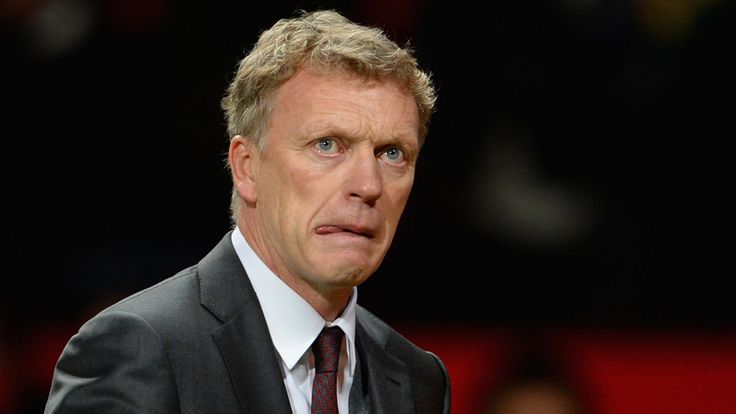A fourth home defeat of the season has left Manchester United languishing in seventh place in the Premier League and the title defence in tatters. While David Moyes blames the referee and fans look to new signings, Adam Bate wonders whether the manager's tactics are the real problem...

Friday 3 January 2014 09:25, UK
Why the tactics of David Moyes, not a lack of new signings, are the problem at Manchester United.
Some are calling it the worst defence of the title ever. Manchester United are seventh in January. No Premier League champions have ever finished lower. They have already lost more home games - four - than in any season in the past decade and there are still nine Old Trafford fixtures left to fulfil. The only comfort for United fans right now is that the transfer window is now open. The panacea could be just days away. David Moyes has sought to play down the club's January activity, recently admitting he wasn't "massively sure" he would bring someone in. While that is unlikely to impress United fans, the real worry for supporters should not be a lack of signings; the big concern ought to be that those signings might not make much difference. Not when there is a problem at the core of the team's style of play. Playing the percentages can be an unwelcome phrase in football. But many coaches recognise that luck is a key element in the game. In The Numbers Game by Chris Anderson and David Sally it is argued that fortune accounts for 50 per cent of the reason for any given result. Some play on this. A Sam Allardyce or a Tony Pulis might enjoy relative success by utilising an aerial game that relies upon second balls and knockdowns, turning the contest into a series of 50/50 battles. Making a football match a 90 minute coin toss suits teams with less quality at their disposal. But the aim for the richest clubs in the division with the best players at their disposal should be to limit the impact of luck. That's why such sides will look to pass their way through the opposition and focus on precision. It is not a quirk that sees Barcelona et al choose to take short corners rather than sling the ball into the box. It is a calculated decision that there are easier ways to score. Of course, crossing the ball is a tradition at Old Trafford. This is a club accustomed to having some of the finest wingers around. Sir Alex Ferguson has relied upon them over the years from Lee Sharpe and Andrei Kanchelskis to Ryan Giggs and David Beckham; from the great Cristiano Ronaldo to the blossoming talents of Adnan Januzaj. But it seems you can have too much of a good thing. Manchester United top the Premier League for crosses per game, swinging in an average of 26.65 of them in their 20 league games so far this season. In the New Year's Day defeat at home to Tottenham, they took the policy to new levels. A whopping 47 crosses were lobbed goalwards for Vlad Chiriches and Michael Dawson to deal with. That was a United high for the season and more than in any game they played last term. It isn't proving an efficient use of the ball in the final third. This is precisely the area of the field where the best teams will play an intricate through-ball to find a breakthrough. Tellingly, that's exactly what the impressive Januzaj did to create Danny Welbeck's goal on Wednesday. It leads to better quality opportunities and United are eschewing plenty of them: 423 of the 533 crosses hurled in have failed to find their target (again, a Premier League high). That's 423 chances to do something better in the last third that have been wasted. It's a disjointed tactic too. Firstly, an emphasis on crossing necessitates quality in wide areas. While United have the numbers, the world-class wingers of the past are missing. Moyes' team has become wilfully reliant on the most mercurial figures in the squad, with the ruthless Robin van Persie reduced to the role of waiting in the box for the ball to arrive from the flanks. Not only is this supply a problem but these wingers are not a direct source of goals either. Ronaldo was a revelation, Beckham averaged more than seven goals per season and Giggs netted 81 goals in his first 12 Premier League campaigns. In the 1994/95 season, Kanchelskis was even the top scorer. In 2013/14, Giggs, Ashley Young, Nani, Antonio Valencia and Wilfried Zaha have contributed just two goals between them. Only young Januzaj - with three goals - has scored more than once. The lack of goals from wide areas mean that goalscoring contributions from midfield are more important than ever - and here too there are problems. Michael Carrick is content in his role as a sitting midfielder but his regular partner Thomas Cleverley is showing little sign of developing into the regular scorer that his position surely demands. He has netted just one goal in 26 appearances for club and country so far this season. At least that's one more than summer signing Marouane Fellaini. The Belgian midfielder has a reputation as a goalscorer after hitting 11 in the league for Everton last year but he has made a disappointing start at United. He is goalless after 11 games for the Red Devils with little more than a red card to show for his efforts. Most alarmingly, it seems that Moyes might envision Fellaini in a deeper role akin to that of Carrick with little responsibility to share the goalscoring burden.